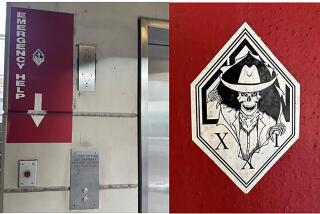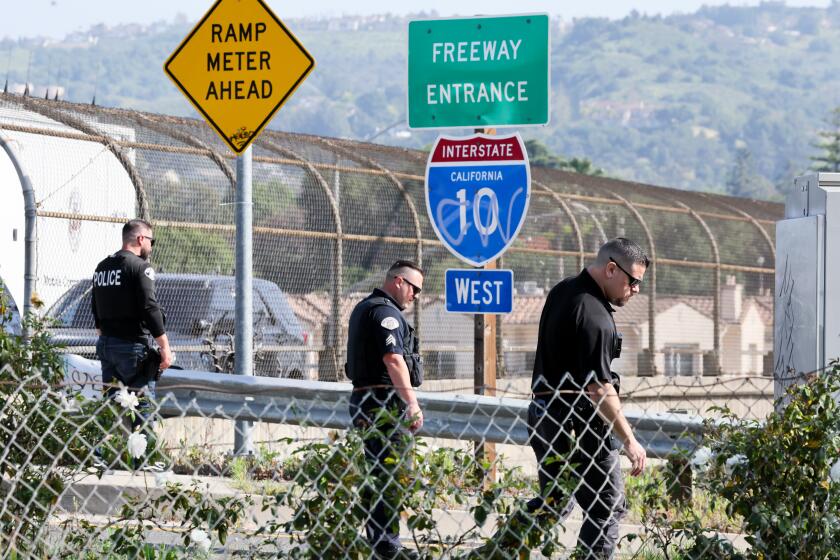Judge deals setback to attorney general’s case against Bell officials
A Los Angeles County judge on Thursday dealt a potentially lethal blow to a far-reaching civil lawsuit the attorney general filed last year as part of an effort to recover money from eight Bell city officials who drew some of the highest municipal salaries in the state.
In a tentative ruling, Judge Ralph W. Dau said that legislators cannot be sued for passing ordinances that award them hefty salaries. It was the latest setback to a case that appears to have been unraveling for months.
Though such a ruling would effectively cripple the sweeping civil lawsuit filed by then-Atty. Gen. Jerry Brown, it would have no effect on the criminal case against former City Administrator Robert Rizzo and seven other current and former city leaders.
Dau said Thursday in court that he was concerned about the attorney general’s accusations that the high salaries in Bell exceeded what was “reasonable and commensurate with defendants’ respective duties and responsibilities.”
Setting municipal salaries is a legislative matter, the judge said, not a judicial issue.
“I don’t want to overstep my authority,” Dau said. “I can’t say, ‘You’ve set unreasonable compensation, I will decide what’s reasonable.’ That’s the city council’s job.” He didn’t say when he would issue a final ruling.
The state lawsuit alleged that council members were well aware that their near-$100,000 salaries for their part-time jobs were “excessive and wasteful” and that they tried to conceal their pay from the public.
The civil suit targeted Rizzo, his former assistant, Angela Spaccia, former Bell Police Chief Randy Adams and current and former council members Victor Bello, George Cole, Teresa Jacobo, George Mirabal and Oscar Hernandez. All except Adams face felony charges for misappropriation of funds. Former Councilman Luis Artiga is also named in the criminal case.
Since it first began looking into the alleged corruption in Bell, the attorney general’s office has had trouble achieving any sort of legal foothold. Critics said the lawsuit, filed in September, appeared to be politically motivated because Brown at the time was running for governor.
Then a request by state prosecutors to delay the case until after the criminal proceedings was denied, and a judge made it clear he thought Brown appeared to be overreaching his authority, even suggesting he “back off” and dismiss it altogether.
The attorney general’s request to appoint an official to monitor Bell was also rejected because a judge was apprehensive about court oversight of a city that has operated independently since the late 1920s.
“It was a creative effort to right a wrong, but it wasn’t clear that the remedy the attorney general was seeking was proper or that he was the right person to seek it,” said veteran municipal attorney Michael Colantuono.
“We have a separation of powers not only between the three branches but between local and state government. You want to find a way to fight corruption without centralizing power in Sacramento. I think what the judge might be saying is the attorney general isn’t the one who gets to decide what’s right and wrong in Bell.”
Colantuono said a taxpayer in Bell might have more success filing a civil lawsuit. The state’s suit seeks to recover an unspecified amount of money for Bell residents.
Defense attorneys have maintained that the attorney general’s office is attempting to operate outside its jurisdiction and has no legal capacity to sue. They expect the judge to uphold his tentative ruling and hoped it would send a message to prosecutors in the criminal proceedings.
“No matter how much they trumpet their horns about wrongdoing, these people were engaged in lawful conduct within the scope of their roles as city officials,” said Ronald Kaye, attorney for Cole. “We only hope that the district attorney’s office can gain some insight from this and stop this witch hunt.”
The prospect of Dau’s ruling, coupled with Judge Henry J. Hall’s decision Wednesday to throw out one count of misappropriating public funds against Rizzo, signifies a lack of evidence in the case, the attorney for the former city administrator said.
Rizzo has been ordered to stand trail on more than 50 counts of misappropriation of public funds.
Deputy Atty. Gen. Mark Beckington said he was disappointed in Dau’s point of view and would decide how to move forward after he received the official ruling.
If Dau upholds his tentative ruling, the state’s only remedy would be the Court of Appeals.
More to Read
Start your day right
Sign up for Essential California for news, features and recommendations from the L.A. Times and beyond in your inbox six days a week.
You may occasionally receive promotional content from the Los Angeles Times.







